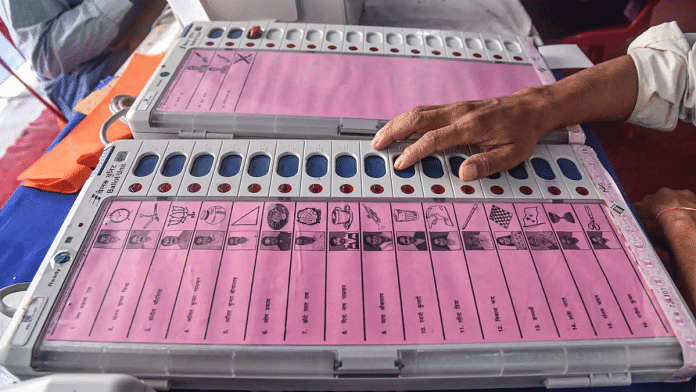New Delhi: A parliamentary panel Friday batted for bringing down the minimum age for candidacy in national elections to 18 years, saying that it would give young individuals equal opportunities to engage in democracy.
The panel also suggested reducing the minimum age requirement for candidacy in assembly elections, a move it believes can promote a wider range of viewpoints in policy deliberations and results.
The Standing Committee on Personnel, Public Grievances, Law and Justice, headed by BJP Rajya Sabha member Sushil Modi, also pushed for increasing punishment for candidates making false declarations/affidavits from the current six-month jail term to two years to ensure fair elections and to protect citizens’ rights.
On reducing the minimum age requirement for candidacy, the parliamentary panel, which looked into specific aspects of the election process and their reform, said that it examined practices of various countries such as Canada, the UK, and Australia, before making the observation to reduce the minimum age for candidacy in national elections to 18 years.
“These nations’ examples demonstrate that young individuals can be reliable and responsible political participants,” the panel said in its report tabled in Parliament Friday.
As per the present legal mandate to contest in Lok Sabha or Assembly elections, candidates must be at least 25 years old, ensuring that they possess the necessary maturity, experience, and understanding of their responsibilities.
Article 84 of the Constitution outlines the qualifications for Members of Parliament, requiring a person to be at least 30 years old to hold a seat in the Council of States and at least 25 years old to hold a seat in the House of the People.
Most European countries mandate that candidates for national general elections must be at least 18 years old.
“….reducing the minimum age requirement for candidacy in elections would give young individuals equal opportunities to engage in democracy. This viewpoint is reinforced by a vast amount of evidence, such as global practices, the increasing political consciousness among young people, and the advantages of youth representation,” the committee has observed in its report.
The parliamentary panel quotes from a report by PRS Legislative Research, according to which in 2019, 47 percent of Lok Sabha MPs are over the age of 55.
“This trend is particularly disconcerting, given that India’s median age is only 27.9 years. Further, only 2.2 percent of Lok Sabha MPs are under the age of 30, while less than 1.7 percent of MPs worldwide fall within this age bracket,” the report states.
In the 17th Lok Sabha, there are currently 34 sitting Members of Parliament between the ages of 30 and 40.
Harsher punishment for filing false affidavit
Batting for harsher punishment for filing false affidavits, the parliamentary panel has said that in order to ensure fair elections and to protect citizens’ rights according to Article 19(1)(a), punishment under Section 125A of the Representation of People Act, 1951 should be increased to a maximum of two years imprisonment and a fine.
However, this penalty should only be applied in exceptional cases, and not for minor errors or unintentional mistakes. Under the new provision, submitting a false affidavit should be considered a violation of constitutional provisions, and an election may be invalidated under sub-Section 1(d)(iv) of Section 100 of the Act.
Currently, the punishment under Section 125A is only six months.
The panel says that this is “insufficient.” “The severity of punishment should be based on the severity of the offence committed.The committee suggests that if someone files a false affidavit, panel their offence level should be taken into account and may be added to the list of offences under Section 8(1) that lead to disqualification,” the panel said in its report.
The Representation of the People Act sets out qualifications and disqualifications for candidates running for public office and provides a structured framework that promotes free and fair elections. Candidates contesting elections must file an affidavit in Form 26 under the Conduct of Elections Rules, 1961.
This affidavit discloses various details, such as their assets, liabilities, and educational qualifications, among others. It is mandatory for candidates to provide truthful information, failing which will be considered a violation of the law and can result in imprisonment under Section 125A of the Act.
The panel also recommends that if a candidate is found to have provided false information, under the updated/new provision proposed by the Committee, they should be deemed ineligible for any benefits resulting from such election. This measure is aimed at ensuring a level playing field for all candidates and upholding the integrity of the election process.
It has proposed that intentionally disregarding other requirements, such as the furnishing of information outlined in Section 33A of the RP Act, 1951, as listed in Section 125A, should be considered a “corrupt practice” under Section 123 of the RP Act, for the ease of filing election petitions.
The report states that among the states, Bihar, Chhattisgarh, Goa, Gujarat, Himachal Pradesh, Jharkhand, Karnataka, Maharashtra, Odisha, Punjab, Rajasthan, Uttar Pradesh, West Bengal, UT of Jammu & Kashmir, and Delhi had some false declarations, with the highest number being 54 in Uttar Pradesh.
Arunachal Pradesh, Assam, Manipur, Meghalaya, Mizoram, Nagaland, Sikkim, Tripura, and UTs of Chandigarh, Andaman & Nicobar, Lakshadweep, Dadar Nagar Haveli and Daman & Diu had no false declarations.
(Edited by Tony Rai)
Also Read: House panel flags low SC/ST representation in top govt posts — ‘as low as 4.8% against 22.5% quota’



